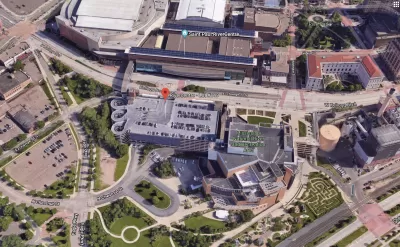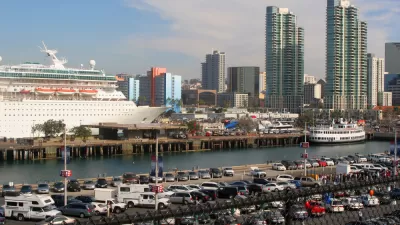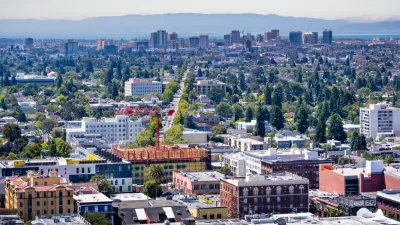Two options for significant parking reforms are under consideration in St. Paul. The City Council could decide to eliminate parking requirements entirely as soon as this summer.

Frederick Melo reports on the ongoing efforts to relax parking requirements in the Twin Cities—where both cities have already relaxed parking requirements along transit corridors.
Efforts to reduce parking requirements in Minneapolis in keeping with the vision of the Minneapolis 2040 Comprehensive Plan were documented by Planetizen in April 2021. The cities have a history of working together on planning efforts, most recently when both cities acted simultaneously to lower speed limits.
Melo's article offers more details about the effort to reduce parking requirements in St. Paul. "Senior St. Paul city planner Tony Johnson has been shopping a presentation on a city parking study to neighborhood district councils, and recently presented the same materials to the St. Paul Planning Commission, which will consider how to adjust the zoning rules in the weeks ahead." The St. Paul City Council is likely to consider the parking reform package this summer.
As for the details of the parking reforms under consideration in St. Paul, two options are in play. According to Melo, "the first option recommended by the parking study would reduce minimum parking requirements for developers, and allow for further reductions if they invest in alternatives to vehicular travel, such as subsidizing transit passes."
"The second option would eliminate parking minimums entirely, though it would not prevent developers from building parking if they wish."
In addition to breaking the news about the status of St. Paul's parking reform effort, the article also serves to introduce the concept, providing a recent history of cities that have achieved parking reforms and the math on how much costs to provide off-street parking for developments in St. Paul.
FULL STORY: For new development, St. Paul weighs reducing (or ditching) parking minimums

Planetizen Federal Action Tracker
A weekly monitor of how Trump’s orders and actions are impacting planners and planning in America.

Maui's Vacation Rental Debate Turns Ugly
Verbal attacks, misinformation campaigns and fistfights plague a high-stakes debate to convert thousands of vacation rentals into long-term housing.

San Francisco Suspends Traffic Calming Amidst Record Deaths
Citing “a challenging fiscal landscape,” the city will cease the program on the heels of 42 traffic deaths, including 24 pedestrians.

Amtrak Rolls Out New Orleans to Alabama “Mardi Gras” Train
The new service will operate morning and evening departures between Mobile and New Orleans.

The Subversive Car-Free Guide to Trump's Great American Road Trip
Car-free ways to access Chicagoland’s best tourist attractions.

San Antonio and Austin are Fusing Into one Massive Megaregion
The region spanning the two central Texas cities is growing fast, posing challenges for local infrastructure and water supplies.
Urban Design for Planners 1: Software Tools
This six-course series explores essential urban design concepts using open source software and equips planners with the tools they need to participate fully in the urban design process.
Planning for Universal Design
Learn the tools for implementing Universal Design in planning regulations.
Heyer Gruel & Associates PA
JM Goldson LLC
Custer County Colorado
City of Camden Redevelopment Agency
City of Astoria
Transportation Research & Education Center (TREC) at Portland State University
Jefferson Parish Government
Camden Redevelopment Agency
City of Claremont





























